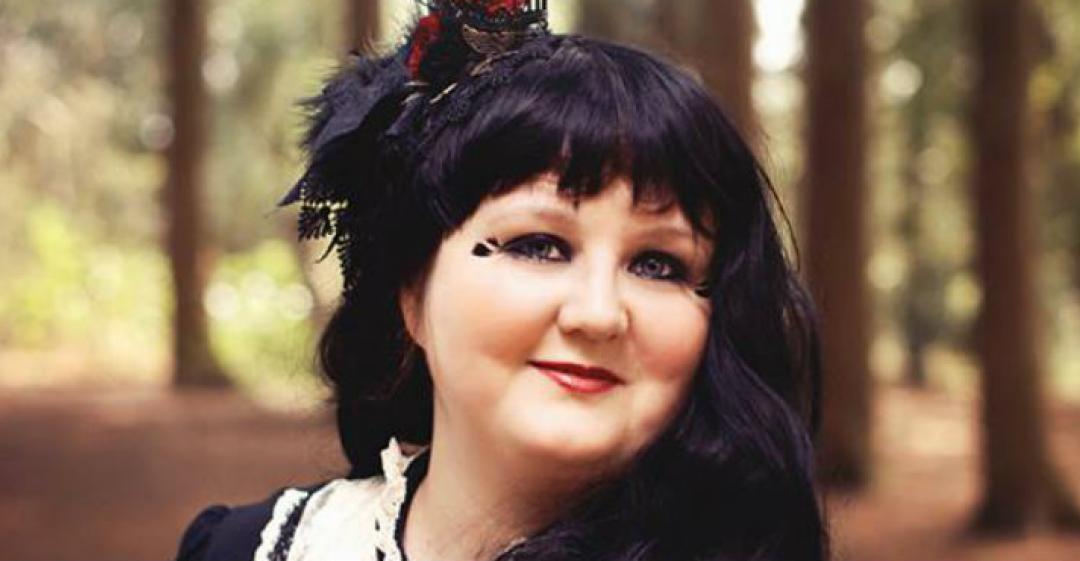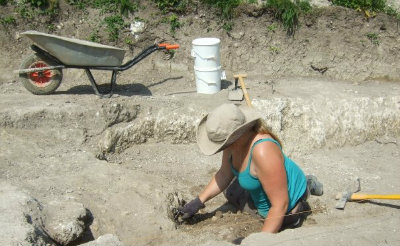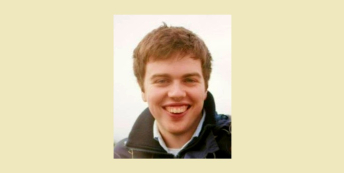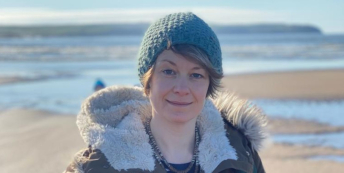“Writing was the only thing that kept me sane through a very difficult time.”

What work were you doing previously?
I was an archaeologist, working both in the field and as a university lecturer.
What are you doing now?
I am now a full-time writer.
I primarily write urban fantasy and dark fantasy fiction; however, I also freelance as a copywriter, proofreader, and editor of both fiction and non-fiction.
My non-fiction portfolio includes extensive work on bipolar disorder through my blog, The Bipolar Bear, and guest writing for other blogs, such as that of Mind, the mental health charity. I also write for The Huffington Post.
I run two businesses: The Bookshine Bandit, which encompasses all my freelance work and provides resources for other authors, and an independent publishing house, Aädenian Ink, and its imprints Astrid Press and Cheshire Cat Books (currently being rebranded as Eldritch Industries).
Why did you change?
Several years ago, I was diagnosed with Rapid Cycling Bipolar Disorder.
The diagnosis was difficult, as I had gone undiagnosed for 15 years despite obvious signs of the illness. It was something I'd lived with all my life and to me, it was normal; it never occurred to me that how I felt and acted could be symptoms of an illness.
When I moved to Suffolk to work in corporate archaeology my manic episodes kicked into high gear.
After my diagnosis, I fell into a very deep, prolonged depression. I was forced to stop teaching, as I could no longer cope, and my PhD studies had long since ground to a halt. I was too ill to find work, and I was extremely confused by my diagnosis and everything that had happened to me.
When I was first diagnosed I started keeping a journal and using writing as therapy to try and understand my condition. This eventually led to me writing a novel. Writing was the only thing that kept me sane through a very difficult time. I finished my novel, but had to put my thesis on hold while I recovered. I then spent a year on Job Seeker's Allowance.
I wasn't well enough to go back to archaeological fieldwork, and, without my PhD, finding a job in academia was very unlikely. Beyond this, I had found that the only thing I wanted to do was write. Writing had got me through some of the worst years of my life. I didn't want to go back to the academic, archaeological world that had completely unravelled my mind.
I simply wanted to write.
When was the moment you decided to make the change?
The more jobs I applied for, the more I realised I was in real trouble where work was concerned.
I'd still not been able to get back to my thesis; while my health had improved through therapy and medication, I found everything related to my previous academic life to be incredibly stressful. Attempting that kind of work caused me to relapse. I realised that, if I wanted to keep my health, I had to change my life completely.
The more I wrote, the better I felt. By this point I had finished my novel, Chasing Azrael, and had been submitting it to various publishers. It had been shortlisted for a breakthrough novel award, and I'd had interest from a couple of small, independent publishers.
I then landed a top-notch literary agent in London.
I was on the train back from meeting my agent for the first time when I realised writing was the thing that would not only keep me sane, but keep me breathing. I was still quite ill at the time and for a long while I laboured under the delusion that my book would sell for millions and I'd never have to do anything but write ever again.
Sadly this didn't happen (I live in hope). I finally recovered enough to realise that, practically speaking, if I wanted to write for a living I was going to have to go about it sensibly.
At this point I began looking into setting up my own business. I wanted to spend my life writing, helping others to write, and – if at all possible – helping others with my condition manage it the same way I had: through writing.
Are you happy with the change?
In most ways, yes, I'm delighted with the change.
I have the freedom to make my own schedule, set my own goals, and spend my time focussing on the projects that are most important to me. It has taken two years to reach that point, however, and I will say that in the early stages – the first year in particular – there were times when I longed for the simplicity of an open field and a four-inch pointing trowel.
I do miss archaeology, there's no denying that, and I'm still trying to finish that thesis. Despite that I know I did the right thing. I am far happier now than I have ever been in my life. Writing brings contentment, understanding, and a sense of order to my otherwise chaotic mind.
It was a difficult change, but that is in large part due to the fact I was so ill during the transition – I wasn't simply transitioning from one career to another, I was doing it while trying to get a handle on an extremely destructive mental illness.
What do you miss and what don't you miss?
I don't miss long days freezing to death and being pelted by the elements.
I don't miss the frustration of spending days, weeks, and months excavating, only to find at the end of it little (if anything) of interest. I don't miss getting up at 4 a.m. and constantly having sand and/or dirt in unspeakable places. I don't miss the pressure and stress of university life.
I do, however, miss the people.
I loved my students and my colleagues, and I got a great deal out of my work with them. I found teaching to be extremely rewarding, and I am often sad at the thought that I will likely never get back to that now, at least not in a professional capacity as a university lecturer.
There is something about the profession that attracts the eccentrics, and most (good) archaeologists I know are hilariously funny for one reason or another. I work on my own now, almost exclusively. In many ways I prefer it that way, but it does get lonely. And there are a lot of people I used to see regularly whom I miss terribly.
How did you go about making the shift?
I applied for for a government start-up loan through the job centre and transformed my writing hobby into a business.
I initially set up the business under the name of Aädenian Ink and worked as a sole trader under that name. My freelance work mainly involved copywriting for various websites, such as Copify. These sites provided an easy way of gaining regular (if low) income. This was far from inspiring work, and a far cry from the writing I wanted to be doing, but it provided me with enough income to tide me over and get Aädenian Ink set up as a publishing house.
I published a novella and a collection of artwork by various artists from around the world, before releasing my novel the following year. The majority of that year was spent working on books and any copywriting work I could find. By the end of the year I was utterly exhausted and didn't feel I had a great deal to show for all my hard work. While the publishing side of things was going well, it was also going very slowly, and had yet to turn a profit.
I refocused and redoubled my efforts where my freelance work was concerned, and last year I launched The Bookshine Bandit. This is a separate business that is entirely dedicated to writing and helping others write. I offer copywriting, proofreading, and editing services directly through my own website now, as well as a range of other services to help authors with their writing, and the all-important task of building their online platforms.
This new structure of two separate businesses – one for publishing, one for freelancing – works very well, and I'm now able to spend more time on my own writing.
What didn't go well? What 'wrong turns' did you take?
Having everything running through one business for the first year or so was a mistake.
I had a lot of freelance services on offer and nobody knew about them because they were buried in the publishing house. As a result, I spent a lot of time doing work for other websites when I should have been building my own business. While this earned me the money I needed to keep everything ticking over, and to finance my writing projects, a lot of the work I was doing I got absolutely nothing out of but money.
It took a while for me to realise that I needed to focus my efforts on doing what I loved, in order to build the business I really wanted.
My greatest disaster in terms of publishing was an anthology I launched a couple of years ago. I completed the entire anthology and published it in a month. It was a total train wreck. I'd rushed everything – the editing wasn't as thorough as it should have been, and I hadn't had the money to get it professionally proofread by someone else so I'd done it myself, with help from friends.
This was a cardinal sin: my friends were not proofreaders, and you can't proofread something you've written yourself. I'd also done the illustrations myself, but hadn't taken my time with them and they weren't what I wanted. Add to that problems with the printers, which I didn't know about until the first print run arrived, and it became a stressful, expensive mistake.
It was an important, but difficult lesson, and one I regularly share with my clients when they're trying to skip the important steps for cheaper or faster options!
How did you handle your finances to make your change possible?
I was extremely lucky in that respect.
I moved back to live with my mum, who didn't charge me rent. The only outgoings I had to worry about were my own bills – phone, car, pet insurance, etc. – and a monthly payment to a debt management plan to pay off all the debt I was in.
Through the government start-up loan, I received £6,000 to get everything going. Then, at the beginning of last year I bit the bullet and hired an accountant who really whipped me into shape; she shaved an astonishing amount off my outgoings and ensured my bookkeeping and tax returns were all done properly. This really gave me a detailed look at where money was coming from and where it was going. I was able to focus on the areas that were earning me money and drop, or spend less time on, areas that weren't.
What was the most difficult thing about changing?
I think for me it was, and still is to some extent, the feeling that I failed.
This is in large part due to the fact I had a huge opportunity where my PhD was concerned. I'd won a scholarship, which was extremely difficult to do, and I’d been working towards a career in archaeology since I started my A levels at 16. It was all I wanted to do with my life. Accepting the fact that it wasn't what I needed to do with my life was extremely difficult.
I felt like I had wasted my time, and the opportunity of a lifetime.
But, ultimately, while I still want to complete my thesis, and would like to go on to publish in archaeology again in the future, I know that is no longer where my career lies.
Coming to terms with that was the hardest part of it all.
What help did you get? 
I had a lot of help from the job centre and start-up loan company.
My mother was also hugely helpful, not only financially but also emotionally. Recovering from my illness was a very long, very difficult road, and one that often doubled back on itself before carrying on. She was extremely patient with me throughout it all. My supervisor at Bangor University has also been very understanding and supportive, as have the faculty there in general.
In the last year I have finally come to the realisation that I can't be a one-woman band. I can't do everything on my own. There will always be that impulse to micro-manage everything, to insist I do every single task myself because, on some level, I'm quite convinced nobody else will do it right. I've realised how wrong this is over the last twelve months.
I took several business courses last year to learn more about business and marketing. The women who run these courses are all exceptional and were extremely helpful. In particular I'm grateful to Leonie Dawson for her fantastic Year Planner, which formed the basis for all my business plans last year and will again this year. I'm also very grateful to my accountant, Kylie Fieldhouse, who is in my opinion made of fairy gold. She's invaluable, as is the latest addition to my helpers, Christine Judd, who now handles all my technical stuff.
I've had a lot of support from friends and family too, in particular Tara Matthews who did my taxes in my first year and took my fabulous author photos.
What have you learnt in the process?
The learning curve for self-publishing alone is so steep I couldn't even begin to recount all the new skills I've had to acquire in the process.
Running a business of your own is also completely different to anything I've ever done before and there have been many, many things to learn in that regard too.
However, I think that the greatest lessons have been personal ones. I've learnt that you should follow your heart, and your dreams, no matter how hard it might be or how much you think you 'should' be doing something else. When you've spent almost twelve years training and working in a particular profession, and everyone expects you to go on to do certain things and have a particular career path, it's extremely difficult to stand up and say, 'Actually, no, this isn't what I want'. For me it was particularly difficult because I did love what I was already doing; it just didn't love me. I've learnt that I can build a life I love, that loves me back.
What would you advise others to do in the same situation?
Every situation is different, and every individual is different, but I would strongly advise anyone who is suffering at work in terms of their health to seek professional help and find out exactly what you're dealing with. Until you know the nature of the beast, you can't tame it.
Whatever the cause of your ill-health, if your job is making it worse you need to prioritise your health. Even if you love your career. If it is a job that is ultimately going to do nothing but make you ill, no matter how much you love it, it's not right for you.
You need to be proactive when it comes to your life and your work. If something isn't right at work, it will have knock-on effects in the rest of your life. If something is out of whack, fix it.
It's as simple and as difficult as that.
The best piece of advice I could give anyone in this position is to believe in yourself, believe in the possibilities of a better future, and believe that you are capable of getting there. You are worthy of that future and no matter what hurdles you have to overcome, or what you may have to change in order to get there, if it leads to a happy, healthy you, it's worth it.
Finally, you are not an island. You exist in a community, and no matter what situation you're in with family and friends, there are people who can help you. Accept their help. There's no need to make it even harder by trying to do everything yourself.
What resources would you recommend to others?
I found that the job centre, once I'd moved away from trying to find a job and towards the idea of starting my own business, was incredibly helpful and had a lot of useful resources. I was very surprised by this.
Other resources I have found invaluable are the work, course, and blogs of Leonie Dawson, Marie Forleo, Denise Duffield Thomas, Dina Behrman, Alex Beadon, Claire Mitchell, and Emma Holmes.
The best resource, however, will always be books. There are books on everything, you just have to look for them and do your research – find reviews and write-ups on them from reputable sources in your field and invest in the ones with the best reviews, most relevant to what you're doing.
What lessons could you take from Hazel's story to use in your own career change? Let us know in the comments below.



